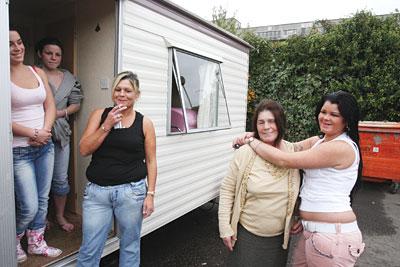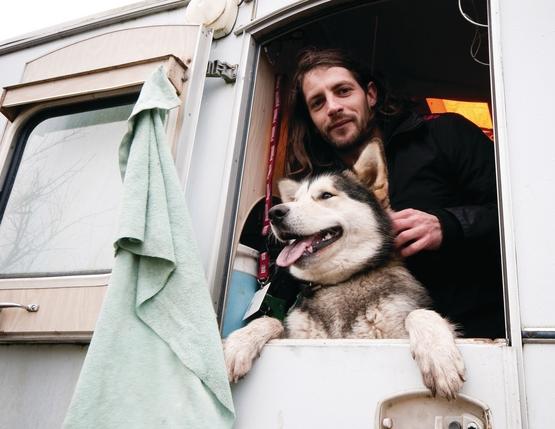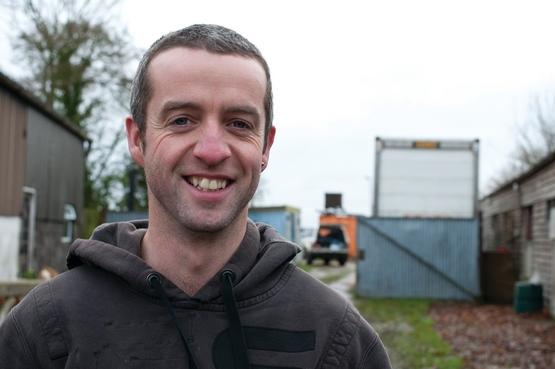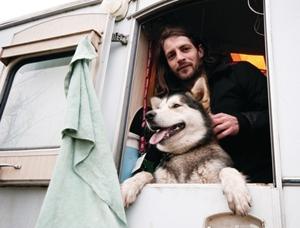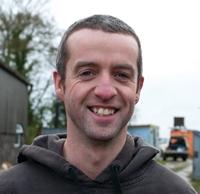Of no fixed abode
Keith Cooper investigates how councils are handling the ‘politically fatal’ yet essential task of providing for Gypsies and Travellers.

Source: Jason Bye
‘Trailer Park UK welcomes you’ would be an apt but wholly unpopular banner to pin onto signs in the Waveney Valley in South Norfolk. Clusters of unauthorised caravan sites slip into sight every few miles as you drive along the roads which criss-cross this picturesque district, home to some 10,000 people.
On an industrial estate, not visible from the roadside, workers live in makeshift mobile homes, crammed alongside ramshackle car repair workshops.
And, in a lane cutting through a pig farm, a jumble of around 25 army trucks, caravans and converted Fords creates a linear camp occupied by a group of New Age Travellers.
All this before you begin to count the authorised and unauthorised camps set up by Gypsies and Travellers who use the farms and fields of South Norfolk as a base or a pit stop.
Like all authorities, South Norfolk Council must tell the government how it will accommodate the Gypsies and Travellers that pass through or settle within its borders. And in common with many councils, its efforts to come up with such a plan is stretching community tensions to snapping point. A consultation paper suggesting that just 20 official ‘pitches’ or caravan areas be created was this month withdrawn unexpectedly after the town hall was flooded with 1,000 comments. Public meetings had to be held outside because the village halls were too small to accommodate the hundreds of people who turned up to protest the plans. The council’s website crashed because it couldn’t cope with the length of some responses. Now the authority hopes to consult on a revised plan in the new year.
Official counts show that the east of England government region in which South Norfolk sits is the most popular area in the country for Gypsies and Travellers. Some 4,440 caravans were spotted in the region in January - almost a quarter of all those counted across all nine regions at that time.
Two key pieces of research examining the issues surrounding Gypsy and Traveller sites show that South Norfolk’s difficulties are shared across England.
A task group headed up by former Local Government Association chief executive Sir Brian Briscoe named site provision as the ‘single most important’ method of easing tensions created by unauthorised encampments.
Sir Brian, a planner by trade, estimates in his 2007 report that a quarter of all Gypsies live on unauthorised sites. The 4,000 pitches needed to accommodate them would cover less than one square mile - a modest amount, he indicates in his report.
Shirking the responsibility of setting up suitable places has dire consequences, the report adds. ‘Failure to achieve this [site provision] will continue to condemn Gypsies and Travellers to homelessness and poor access to services that has left them with the worst health and educational outcomes of any part of the community.’
The legal action authorities took against unauthorised sites when there was no alternative, authorised accommodation available was ‘costly and essentially futile’, his report says.
The estimated annual cost to town halls for such action was put at £18 million in a 2006 report by the Commission for Racial Equality. The cost of tackling even a single case can put a significant strain on a council’s budget.
South Norfolk has so far forked out £250,000 attempting to close down just one unauthorised encampment, Denton Farm. ‘This is equivalent to
5 per cent of council tax,’ says council leader John Fuller.
The authority is currently trying to find acceptable sites for Gypsy and Traveller families and admits that there have been far too few for far too long. Although the process is proving tough, the council is determined to see it through, Mr Fuller says.
‘Once and for all have to address the issue. We can’t afford to play cat and mouse at enormous cost to the taxpayer and the Traveller community.’
Mr Fuller defends the decision to withdraw the site proposals after the vigorous response. ‘“Council listens shock”,’ he quips. ‘We have to hit the very high legal bar of soundness and we need to balance the needs of the settled community with the recognition that a number of people in the Gypsy and Traveller community have poor outcomes. Many are born and bred in South Norfolk. They are local people.’
The strength of opposition to Gypsy and Traveller sites makes supporting their creation an unpopular job for political leaders and council officers alike, research shows.
One councillor writing in the Briscoe report says that backing the creation of places for Gypsies to settle was seen as ‘political suicide’ by his counterparts.
Similar language was recorded by CRE researchers during their interviews with local authority officers. ‘It would be career suicide [to support actively Gypsies’ and Irish Travellers’ needs],’ one said. ‘I was personally threatened. It was very intimidating indeed. After another public meeting an officer came out to find her car smeared with dog mess.’
The Briscoe report also attempts to scotch some common misconceptions about Gypsy and Traveller sites, especially that levels of crime and anti-social behaviour shoot up when they arrive. ‘While there is no evidence that this is the case, such perceptions challenge community cohesion and feed opposition to the development of new sites,’ it states.
The idea that Gypsies routinely turn their campsites into rubbish dumps is also rejected by Briscoe. ‘Fly-tippers may choose to dump waste near to a site in the belief that Gypsies and Travellers will be blamed.’
Iain Cairns, team leader of the Gypsy and Traveller service at Somerset Council, which was recognised for its work integrating communities at this year’s UK Housing Awards, agrees with the report’s conclusion. ‘People drive up to the side of the Gypsy site at dusk and dump [waste] on the drive. Of course Travellers do fly tip but they are wise enough not to do it on their own doorstep.’
But although Gypsies suffer a bad press, Mr Cairns says there is another group which endures even greater stigma. ‘Gypsies are on the second rung, the New Travellers are on the bottom rung. There is more understanding within the community about Gypsies. They see them as a culture, families no different from us. I don’t know an authority in the country that had grasped the nettle of providing for the New Travellers.’
The Gypsy family which built the Denton encampment is helped in the on-going feud by two locals - campaigner Stuart Carruthers and retired engineer Chris Elliott, from whom the family bought a piece of farmland in 2004.
So far the dispute has seen the council deal with three planning applications, three planning appeals and, in 2006, face the Jay family in the High Court. Although the Jays lost that case they are hoping to return to the High Court for a judicial review into the way they have been treated by South Norfolk Council over the past two years.
The family questions the legality of the authority’s decision to finally break up and clear the unauthorised site in September last year. The Jays also want judges to examine whether the authority had the right to sell off their land to pay for the cost of clearing the site. Councils have the legal right to do this to recover such costs. But Land Registry papers seen by Inside Housing show that the council had sold the land before it had been officially registered.
The council cleared the site after the family left it but the Jays insist that the clearance destroyed £155,000 of property belonging to themselves and Mr Elliott. The family also insists the council should not have cleared the site until an alternative had been found.
Clifford Jay, the Gypsy who purchased the Denton site, wants back the money he lost on the land. ‘We have lived here all our lives. We are not trouble. I am not leaving. Not for the council. Not for anyone.’
The land was bought with money he inherited from his parents and he is determined to get it back. ‘My mother’s and father’s money isn’t going to be wasted by not getting anything back in return.’
He bluntly rejects suggestions that the Denton farm camp is an eyesore or that the presence of Gypsies automatically spells trouble for an area. ‘We don’t believe in shitting in people’s gardens. We put in portable toilets.’ All his family want is a site where they can live, he insists.
The arrival of a group New Travellers in South Norfolk has added to Mr Jay’s frustration at the council’s failure to find his family a suitable site. ‘They let the hippies live here who came here long after we were here.’
Once South Norfolk has finally got its new sites set up it will be difficult to justify throwing people off unauthorised encampments.
Like other councils it could save hundreds of thousands of pounds by negotiating with Gypsy and Traveller groups instead of resorting to enforcement action. Ultimately it has to find decent places for them to settle.
As the Briscoe report concludes: ‘Gypsies and Travellers are entitled to have somewhere safe and secure to live. They also have responsibilities to abide by the law and respect the interests of the settled communities. Until there are sufficient places for them to live there will be conflict between these principles.’
The Gypsy condition
90 per cent
Proportion of council areas in England and Wales through which Gypsies and Travellers pass
18 per cent
Gypsy and Traveller mothers who have experienced the death of a child
1 per cent
Proportion of mothers in settled communities who have experienced the death of a child
12 years
The difference in life expectancy between Gypsies and members of settled communities
The New Travellers
The odd assortment of adapted vans, trucks and conventional caravans that make up the New Travellers’ site in South Norfolk are interspersed with bleached-plastic picnic table and piles of firewood. Makeshift verandas have been bolted onto the side of some of the vehicles, paying testament to the fact that the camp has been around for some time.
Although the site is tolerated now, the council has already warned the Travellers that they will have to move to one of the authorised sites once they have been set up.
Thomas Miles, 28, a carpenter, says he has lived on the site for more than a year. ‘Because of the cost the council pulled out the first time we went to court. They now say that [when the new sites are built] they will go back to court - no matter what cost.’
The showman
Travelling showmen are another type of Traveller that uses South Norfolk as a base.
Paul Wassell, a member of the Association of Independent Showmen, rents space on Denton Farm from Mr Elliott.
It is the perfect space for him to store and repair the ladder trucks and lorries he uses to cart big tops and marquees around the country.
His services are called on by the organisers of festivals across Europe, such as Glastonbury.
‘It is priceless for someone like me because I can live here, can come up with my big lorries. It is difficult to find places to park your big lorries. I did have another workshop but I couldn’t park anywhere.’


